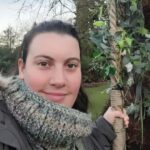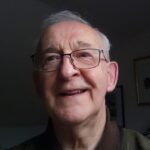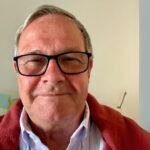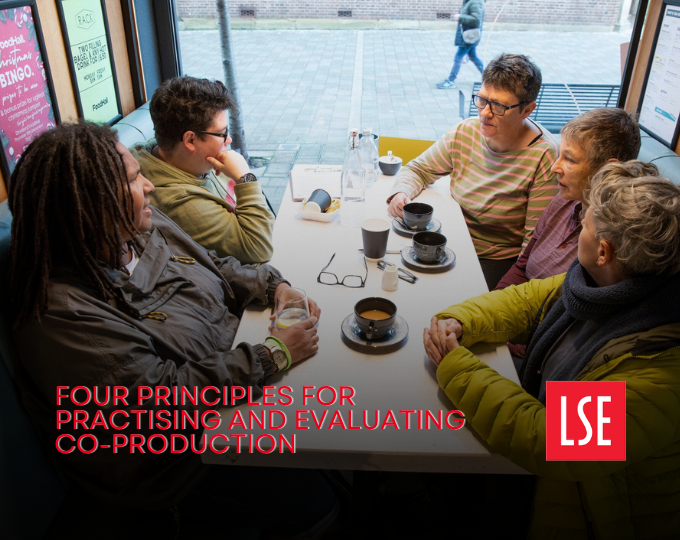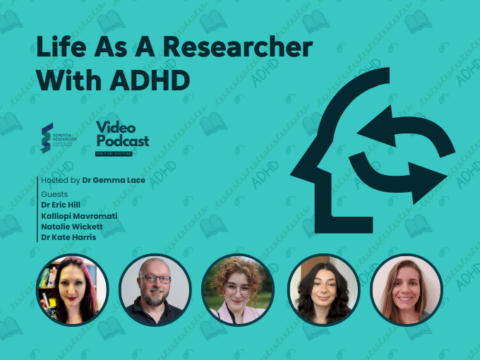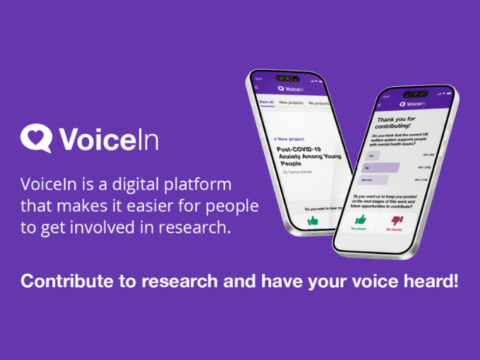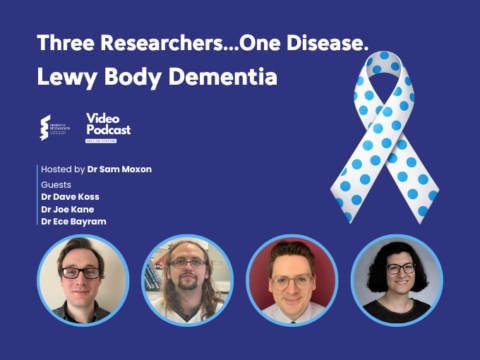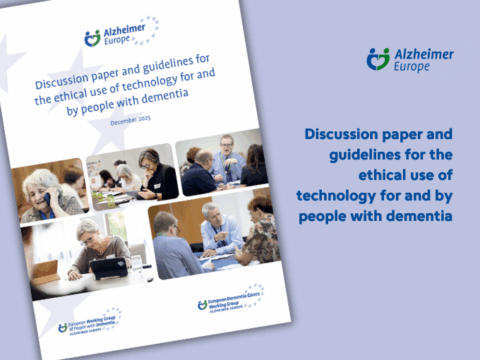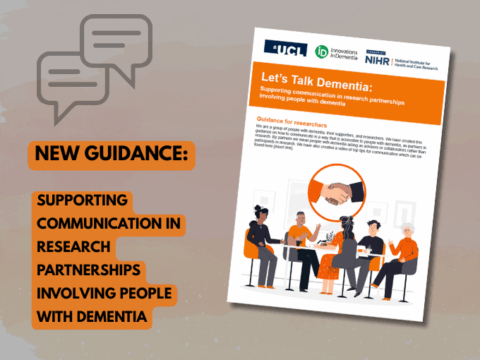In this episode of the Dementia Researcher podcast, Dr Anna Volkmer leads a discussion on the importance of co-production in dementia research. This episode explores what it truly means to involve people with lived experience, with tips on how to go about it, and our guests own experience in working together. They also discuss the research process and how this approach can lead to more relevant and impactful outcomes.
Featured Guests:
- Dr Barbora Silarova: An NIHR / Alzheimer’s Society Dem Comm Fellow at the University of Kent. Barbora brings her expertise in supporting people living with dementia and their carers. She shares insights on the significance of equal partnerships in co-produced research and the challenges and rewards of this collaborative approach.
- Dr Rosie Ashworth: A researcher who leads patient and public involvement for the NRS Neuroprogressive and Dementia Network in Scotland. Rosie discusses the importance of involving those with lived experience in research to enrich the quality and relevance of scientific findings.
- Winnie Henry: A retired psychotherapist who cared for her husband with vascular dementia. Winnie provides a personal perspective on the value of co-production, emphasising empathy and the importance of ensuring that carers' voices are heard in research.
- Mike Parish: A retired firefighter who became a carer for his husband, who had progressive supranuclear palsy. Mike highlights the importance of representing diverse experiences and backgrounds in dementia research to ensure all voices are considered.
- David Ross: A retired engineer who cared for his wife with frontotemporal dementia. David speaks about his journey into co-production, driven by a desire to understand more about dementia and contribute to meaningful research that reflects the realities faced by carers.
Together, these guests provide valuable insights into the process and benefits of co-produced research, offering practical tips for researchers looking to adopt this approach.
Three key take-aways from the podcast:
- The Value of Co-Production in Research: Co-production in dementia research ensures that the perspectives of those with lived experiences, such as unpaid carers and people directly affected by dementia, are central to the research process. This approach not only enhances the relevance and impact of the findings but also addresses the real needs of the community involved.
- Challenges and Rewards of Co-Produced Research: While co-produced research can be more time-consuming and challenging, particularly due to the need for ongoing communication and managing diverse viewpoints, it is ultimately more rewarding. The involvement of people with lived experience leads to more comprehensive and empathetic research outcomes, fostering a deeper connection and mutual respect between researchers and participants.
- Practical Tips for Researchers: Effective co-production requires empathy, flexibility, and open communication. Researchers are encouraged to build strong relationships with participants, be willing to adapt to different needs, and ensure that everyone involved feels valued and heard. This collaborative approach can transform the research process, making it more inclusive and impactful.
Tune in to learn more about how prioritising people can transform the way we approach dementia research.
Voice Over:
The Dementia Researcher podcast, talking careers, research, conference highlights, and so much more.
Dr Anna Volkmer:
Hello and welcome to the Dementia Researcher podcast. I'm Dr. Anna Volkmer. And today we are exploring a topic that's transforming the field of dementia research, co-production. In today's episode, we will be discussing what it truly means to prioritise people in research going beyond the conventional methods that are often taught to us in textbooks. As a researcher with a clinical background in speech and language therapy, it has always made a lot of sense to me to work with people on research rather than doing research on people.
As I feel sure some of you are aware, particularly those working in qualitative fields, co-produced research is more than just a new approach. It's a significant shift in how we engage with those directly affected by dementia. And thanks to funding from the NIHR Three Schools Dementia Research programme, a dedicated team of 10 individuals, including importantly, both academics and unpaid carers, have collaborated on a research funding application.
This project focused on how unpaid carers can support their own health and well-being while caring for people with dementia. And over the past year, this diverse group met regularly combining their unique perspective and expertise to shape the direction and methodology of the research. So today, I'm joined by five people from the programme to share insights from this collaborative experience discussing the importance of co-production in dementia research, the challenges encountered and the benefits of involving those with lived experience as co-researchers. I hope we will also provide some practical tips for anyone considering a co-produced approach in their work. So, without further ado, it's my pleasure to welcome Dr. Barbora Silarova, Dr. Rosie Ashworth, Winnie Henry, Mike Parish and David Ross. Hello, everybody.
Dr Barbora Silarova:
Hello.
Winnie Henry:
Hello.
David Ross:
Hi.
Dr Anna Volkmer:
So why don't we all introduce yourselves? So, I'm going to ask David. David, could you introduce yourself first?
David Ross:
Yeah, good afternoon. My name's David. I'm a retired engineer and I was a carer for my late wife. She had frontotemporal dementia with overlapping amyotrophic lateral sclerosis.
Dr Anna Volkmer:
Thank you. David. And Winnie, tell us a bit about yourself.
Winnie Henry:
Good afternoon. My name's Winnie and I'm a retired psychotherapist. I was a carer from my husband who had vascular dementia, and he's now passed away.
Dr Anna Volkmer:
Thank you for joining us, Winnie. And Mike.
Mike Parish:
Hello and good afternoon, yes, my name's Mike Parish. I retired from the London Fire Brigade after 40 years career, retired early to look after my husband who developed progressive supranuclear palsy, a rare form of dementia. He passed away in 2022, and I've made it my work and my mission to support people through this process past caring for my husband.
Dr Anna Volkmer:
Thank you, Mike. Rosie.
Dr Rosie Ashworth:
Hello. So, I am a researcher who leads patient and public involvement for the NRS Neuroprogressive and Dementia Network, which is a bit of a mouthful and in rich Scotland. So, my key role is around a group called Partners in Research and facilitating involvement in projects like this.
Dr Anna Volkmer:
And Barbora.
Dr Barbora Silarova:
Yeah. Hello everyone. My name is Barbora Silarova, and I work as a dementia research fellow at University of Kent. And I'm really keen to find out how we can best support people living with dementia and their family members and friends.
Dr Anna Volkmer:
Fantastic. Well, I feel very privileged to be here with you all. I have to confess that I already know Rosie and Barbora a little bit, so this is even more of a treat. So, thank you all for being here. Let's get into it. Now, Barbora, can I come to you first? Can you give us a little bit more of a background about this project and how it's come about, if you will?
Dr Barbora Silarova:
Yeah, of course. So back in 2022, I applied for a Dementia Career Development Award. And basically, when we think about the development awards, it's slightly different when applying for a research grants or project grants. So, the development awards are really about you and helping you how to become a future leader in specific research field. And in this case, it was in dementia. And as part of this award, I actually said that I would like to co-produce a bigger research application alongside eight people who had an experience of supporting someone living with dementia. And there were two, I think, key things that I said in this research application that A, the focus would be really on unpaid carers and how to best support their health and well-being, but more importantly, that it will be co-produced. So, from beginning till the end, we will work alongside people who this research is about.
And if I can say a few more words about this, I think we were extremely lucky and privileged to get this funding because that's not always the case, that you have the money that supports you to work on research applications. So, for example, we spent one year working on this research application and every month we would meet for two hours and of course, sometimes we would even work in between and all these meetings and all these work that experts by experience provide to this project is paid for. So yeah, so it was a fantastic opportunity and I'm very grateful for this award and for the fantastic team that it allowed us to build.
Dr Anna Volkmer:
Yeah, it's brilliant. It's an absolutely critical component that people are reimbursed financially for their time, and it really places the value I think, on their time and expertise. So that's absolutely brilliant that you all got that support. And so, we're talking about co-production. I think that the people in this room probably, we're all people who've done co-production, but I wondered if you had to talk to other people who maybe hadn't experienced or been part of co-production, why would you say people should even care about co-production? Rosie perhaps let's start with you on this.
Dr Rosie Ashworth:
So, I think the main reason is because there is so much more, we can learn by involving people with lived experience. And we often call it a ceiling effect, the maximum you can learn by not involving people who've had that everyday experience of living with or supporting someone with a condition like dementia. And it's a condition that impacts people's whole life and relationships and all these different things. And so, by involving those with lived experience, we get a completely new perspective that truly enriches what we learn and makes for better quality research overall, I would argue.
Dr Anna Volkmer:
That sounds good. That makes complete sense to me. I think with my clinical hat on, I've always found it interesting that researchers go off and just do research they think is good without working out what actually is going to work for people because you wouldn't give somebody speech therapy that they didn't want. You really have to do research that people want and need. I think that makes so much sense to me. Does anybody want to add to Rosie's statement? How would you explain it to other people? Winnie?
Winnie Henry:
From my point of view, the thing about partners in research working with an academic is I've purely got on the hat here of being a carer, not looking at my background at all of anything that I was bringing to the table. What I was bringing to the table was that I had been Willie's carer and had saw how when we went down the route of going to hospitals and keeping appointments, how the professionals talked over the top of us. We didn't have a voice. And this is my chance to make sure that people coming behind me will have a voice.
Dr Anna Volkmer:
That's huge. That makes so much sense as well. So that really gets to the heart of what co-production means to you. Mike and David, do you want to expand on what co-production means to the two of you? Mike, do you want to go first
Mike Parish:
Please, yes, thank you. I'll echo exactly what Winnie said that we're talking about the real world, the nuances, the impacts, everything that we do as a carer has a knock-on effect that then affects other things. It's a continuum of issues which gather momentum and increase. And that's very difficult for people to convey and it's very difficult for people to write down and for somebody else to read a book all about it. But for me, what really counts is it validates the research so that if somebody says, "Well, you've got this outcome from that discussion group," and it's the same as an academic thing, you cite other people, you cite evidence. In my view, you cite the evidence through the input of individuals who have that lived experience. So that's very important. If it hasn't got that, you have to ask yourself, "Where did they get this information from?"
Dr Anna Volkmer:
Absolutely. My experience has been that people have told me what's important to their lives and then that's really highlighted what I should continue researching and that's really made it relevant. So, I hear that completely, Mike. David, what does co-production mean to you?
David Ross:
I think what's important is that we have experience which lasts 24 hours a day. We are observing, we are seeing the effects of this terrible illness. And it's something that you don't find it in the laboratory, you don't find it in books. And when you're dealing with, as we have done in the past, with young PhD students, they have got no idea because they have not had that experience, thank goodness. So therefore, I think that it's probably one of the best ways to actually encompass the whole thing about the research.
Dr Anna Volkmer:
Yeah, good point. Yeah, you've got the experience to make it relevant. That really brings together what Mike and David are saying. Thank you. Barbora, did you want to add anything else?
Dr Barbora Silarova:
I just think for me personally, it's really like, we talk about this also in our previous meetings, really that equal partnership when each person voice is equally valid and each opinions is taken on board. And I think there are all the conversation about what equal partnership looks like in co-production. So, I think that's quite fascinating concept. And the way how I always think about is almost like, okay, we are a research team and each of us is bringing a different expertise and that's simply how I should treat each person. So, it doesn't mean that every single time I will accept everyone's opinion. It doesn't mean that each person has to do everything. It doesn't mean each person has to contribute the same amount of work, but ultimately, we all take an ownership for the research. We all feel like, "I was part of the decision making. I understand why decisions were made."
So, I think that's for me, real co-production. We are all equal. Of course, there will be probably one person who has little bit more power than others, but that's how I think about it. And on a personal level, I think it's one of the most rewarding ways of working. It can be one of the most difficult one, but one of the most rewarding. So, if anyone is thinking, "Oh, I need that extra motivation in my research. I'm not sure why I'm doing this work." I think co-production is really way to go.
Dr Anna Volkmer:
Yeah. Yeah, I agree. I've found it to be the most rewarding and the most motivating. I work with a particular collaborator on my co-production team. He's like my cheerleader. And even when I'm feeling down, he's the person... It's almost vital actually. That gives me the energy to carry on. So, I can see why you're saying about the motivation as well. I agree. This is why I was really excited to host this discussion because I think this is something that's so rewarding and motivating. I can't possibly see why people wouldn't want to do co-production. But I guess I wonder, it's perhaps an obvious question and perhaps we've already answered, but sometimes people say to me, "But why should we listen to people with lived experiences?" Or "How can we explain what the science to people with lived experience is? It's too complex." And I think, again, perhaps we've already talked to this, but is there anything else, Rosie, that you would add to what we've said?
Dr Rosie Ashworth:
I think particularly in terms of the idea that science is too complex, I've always been taught that if you truly understand something, then you are able to break it down into its parts. And although there are always going to be certain technical jargon in terms that may be harder to do that with, on the whole, something that affects somebody's life, they should be able to understand and be explained to in a way that works for them. And I think it's our job as researchers with our academic hats on to say, how can we make sure that that then is translated into a shared language where yes, there may be jargon, but if there is, it should always be very clearly explained. But actually, a lot of the time you can just get rid of it. It's not necessary.
And you are almost made to feel like you're being less scientific by not using those terms. And actually, you're not at all. You're being often more clear and more transparent about what you're doing if you can explain it like that. So, I think it's quite grounding in science when you can practise that accessible language. And we do not always get it right. There's always going to be times we get it wrong or that you think, "Oh, I've explained that really well, that makes sense," and everyone looks at you blankly and you start again. But actually, that's part of our role, that's part of what we bring to the table, and I think it's really, really vital for how people engage in research but also understand their own health and well-being.
Dr Anna Volkmer:
So, what do you think makes people hesitate about doing work in a co-produced way, Barbora? I mean, Rosie's spoken to a couple of things, but do you think there's other reasons that people hesitate?
Dr Barbora Silarova:
Yeah, I think there can be some barriers as well. But when I was thinking specifically about the hesitation and just reflecting on me and putting aside how maybe people perceived people with lived experience, I think often I feel like co-production can seem such an overwhelming approach. I think it's such a different way of working compared to how I was trained, for example. Sometimes I'm joking about this in our group, I need to have everything structured. I need to understand how A leads to B and C and to have an exact backup plan. And that's how I'm thinking. But with co-production, when you go to these training materials and what co-production is, it's like, one size doesn't fit everyone. There are 10 principles, you just need to figure it out for yourself.
And I was thinking to myself, "I don't want to figure it for myself because I like to get things right." So, I felt quite... I was like, "Oh, my gosh, I love the idea of it, but I don't know what I'm doing, literally." And I almost felt like it's not for me because I don't know what I'm doing and maybe I'm not the right person to work this way. So, I think sometimes maybe we have this expectations and sometimes when I thought about it, well, we don't expect someone to run an experiment right the first time, so we need to understand this is a specific way of working that requires a lot of training, a lot of self-reflection, a lot of honesty. So yeah, maybe that's not the typical hesitations that people have, but...
Dr Anna Volkmer:
But no, I think it's true. I've had conversations with researchers where they've said they feel worried or anxious about doing it because they don't know what to do or don't know specifically how to approach people or meet people actually. That's another thing that people have asked me. They've said, "How do I find people to do co-production with?" And that actually brings me around to a question I should have asked you all sooner. Winnie, Mike and David, how did you get involved with this project? How did you hear about co-production and get involved? I don't know, should we start with Winnie?
Winnie Henry:
Well, I was actually in... My husband went up for a clinical trial about, I think it was 2011. And while we went up there, I was asked if I'd like to go on board with, it was a networking team, is that right, Rosie? Yeah. And I had very, very little to do. Occasionally, I would look over someone's work. There was not a lot to it, but I was already retired, so it didn't matter. Well, the only thing I had is Willie. I tended to him 24 hours and I was trying to sometimes push it in and then along came Rosie and it was as though a whirlwind had taken place and all of a sudden, we had this team together and it was, "Let's write a book." I thought, "Yeah, okay. How could I write a book?" Before we knew we it, we were all joined together. We had an empathy with each other. We had trust in each other and that was the most important thing. And that was me in research and Partners in Research. I'm still in it yet, still getting things to do.
Dr Anna Volkmer:
So, the relationship sounds like a key ingredient in there, building up a relationship, essentially. So, we're starting to get on to some tips and hints for future co-producers, so having a good relationship, which is perhaps a skill hopefully, that most humans have. It's perhaps something that is a real important ingredient. Thank you, Winnie. It sounds like a really rather joyous experience for you, yeah. Mike, how did you get involved?
Mike Parish:
Well, I was already on another focus group and the researcher for that raised the issue about this particular project and I said, "Yes," because as far as I'm concerned, it's not the same for everybody, their availability of time is always going to be an issue if they're an existing carer. But for me, it was just past the time that I was caring for my partner, and I felt that this was, for me, it's going to be different for other people, but this was a way of continuing the caring because it suddenly stopped. So, you're able to use that energy to feed back into the system hopefully to make things better for other people. So, I just got wind of another project and experienced a very good experience in the first one and wanted to continue.
Dr Anna Volkmer:
So, was it just the researcher you were working with at the time had forwarded you on another advert for this? Is that basically it?
Mike Parish:
Yeah, just asked if there's anybody interested in this project that was happening and-
Dr Anna Volkmer:
About to start, okay.
Mike Parish:
... lo and behold, yeah.
Dr Anna Volkmer:
Interesting.
Mike Parish:
And I was glad to be invited to take part. I don't know what I'd have said if they said, "No."
Dr Anna Volkmer:
Good question.
Mike Parish:
Yeah.
Dr Barbora Silarova:
Well, I'll keep that as a secret forever.
Dr Anna Volkmer:
Well, I'm sure Barbora would've been disappointed because it's obvious that you have a wonderful relationship, that you've obviously developed a wonderful relationship, a key ingredient, and it's continued from there. So, David, how did you get involved in the project and co-production?
David Ross:
Well, my entry into it is slightly different from most people's. When my wife was diagnosed, I asked a question. I thought, a simple question, "What caused this?" And the answer I got was, "We don't know, and everyone is different." And that didn't satisfy me because I'm a very inquisitive person and I wanted to get to the bottom of it. So, I started to do a lot of research into her, her family, her medical conditions, her lifestyle. I spent 15 months researching all of this and wrote a book about it. And then I found that I couldn't get my book published because I wasn't an academic. And despite an academic having read my book and agreed with everything in it, I still couldn't get it published. And that's when I came across Rosie, again. I can't even remember how we came across Rosie, but we did. And thank goodness we did because it opened up many, many avenues. And I personally am now involved in many, many different projects. But it was all because I couldn't get an answer to a very simple question.
Dr Anna Volkmer:
Your desire for knowledge led you down a really fascinating path and then you met Rosie's opened all these doors. So, all three of you actually come to co-production through very different routes. And I think that's actually probably quite important to flag, that there's not just one route into co-production. There's actually lots of different routes and some of them might be more meandering and some of them might be a little bit more direct. But certainly, you've all had an interesting journey by the sounds of it and very much appreciated. I can see by the team you're now in. So, we've already started collecting a few tips and hints. I mentioned this earlier, but I've got a of two-part question for all of you. There are obviously challenges and you flag things time is a challenge. What are the other challenges to co-production that you've encountered? And I guess what are the benefits though that outweigh those challenges?
David Ross:
Basically, I think one of the things is that first of all, as a member of the general public, having been confronted with dementia, I am totally unaware. I have no knowledge. I've never come across this before. I want to find out things and I want to help. And I think the problem is that when you get involved with other people like academics, you don't think that you'll be taken seriously, and you find barriers. And there are barriers, to be honest, and I still come across various barriers, but you have to try and be confident and break down those barriers and get people to accept you. And acceptance is probably the hardest thing of all.
Dr Anna Volkmer:
So, you have to be quite persistent actually. And I'm sure there'd be loads of people who wouldn't continue. You have to be a certain kind of person to persist, right?
David Ross:
Yeah, I wanted answers.
Dr Anna Volkmer:
Yeah, and I can see that's perhaps resonating with Mike.
Mike Parish:
What I was going to say is for me, my driving thing, because I think we look at the academic side looking for that input and sharing their mission and then bringing people in, but I think we also know that each of us has a different route into it. We have different reasons why we want to do it. And for me, it was about a broader thing, which to do with diversity and cultural differences and those nuances, I'm going to use that word again, that might be difficult for somebody who's coming from an academic point of view.
From a personal lived experience of their own, how do you then broaden that so that they're open to the experiences of people who could be having very different personal experiences on the ground in reality. So, I think to look for diversity and cultural difference is really important in identifying potential co-producers from lived experience. And so that's why I came to it. I think that for me, I come with that, that's the bag that I come with. And I'm delighted that I'm invited to do that, and I can do that, and we reach consensus through that process, I think, so yeah.
Dr Anna Volkmer:
Thank you. That's such a valuable point because I think researchers are quite a homogenous group. And actually, we often recruit, really. When we do these big studies, the research participants, we try and homogenise them as well. So, we've got this comparable group, but actually, in real life people are diverse and we need to hear diverse voices. Thank you for that perspective, Mike. I'm glad you mentioned it because I was going to mention it if you didn't, so I'm glad you got there first. Winnie, did you want to add something?
Winnie Henry:
I was absolutely blown away there by Mike's answer. I was really deep in it. That was wonderful, Mike. For me, it's about empathy, it's about compassion, it's about showing, dare I say, love for your fellow man no matter what guise they are wearing at the time and knowing what they've went through or what they're going through and just being there as a support for them.
Dr Anna Volkmer:
Yeah, which is obviously something that you get something from as well. It's a reciprocal process, yeah. Rosie.
Dr Rosie Ashworth:
I was just going to add to that in that I think one of the challenges for researchers, particularly if their background has maybe been in say, more biological sciences or psychology and things like that, is that you are often taught that you should be very separate from the people that are sharing their lived experience. And co-production really turns that on its head. And you have to decide how much of yourself to share, how vulnerable to be. And although in some ways researchers can be a homogeneous group, as you say, also, there's a lot of us who do have lived experience sometimes of the same condition, sometimes of other conditions that we have to decide how much to share, but also what hat we're wearing. And so sometimes you might go, "Well, I do have that experience, but in this room I'm here with my research skills and the others are providing that lived experience," and being able to recognise those different roles that you might play.
But I think it can be very difficult because the training isn't really there because really, the training is actually more around almost therapeutic skills, which often don't get seen as being put together with research. So, I think it's also shifting from an academic standpoint, the expectations around the sort of training that co-production researchers might need to facilitate this type of work because it is scary. And as Barbora said earlier, you think, "Oh, am I going to do it wrong?" And so much of that is because it's very hard to make sure the information's out there about how to do it.
Dr Anna Volkmer:
And I think adding to your point a bit, I get the feeling in research and academia that often the more technical you are, we're circling back to a point you made earlier, the more technical you are, the better you are at your job. So, you should keep yourself apart speaking a technical jargon laden way and elevate yourself somehow to become a better research. I'm kind of growing as I say it physically, aren't I? But then somebody recently was saying to me, "But actually," it was a very successful researcher, and they were saying, "In reality, the most successful researchers are the ones that can make their research communicable to anybody," again, coming back to what David was saying, "so that everybody knows about it."
And if people in the general public know about your research because it's been communicated clearly, then that's a successful piece of research. It's not successful if you are off in some kind of academic room with other academics, you haven't really told anyone anything. But actually, if you've communicated to the wider world. And I thought that really turned it on my head for me. I was like, "Oh yeah, you're right, you're right." You're more successful if you tell everybody.
Dr Rosie Ashworth:
The challenge is do the people that are employing you or do the institution recognise that success? And that's-
Dr Anna Volkmer:
This is true.
Dr Rosie Ashworth:
... I think, a challenge that as an academic you often face, because I can't tell you the number of times people have said, "You've written that too excessively. Other scientists won't take it seriously." And you're like, "I don't know what to do with that." And you're being told to add the jargon back in because even though it means the same, it won't be viewed as scientifically valid for say, a journal or publication. And so, then you're not getting the academic currency you might need to succeed within your job role, but actually you might be succeeding much more in the real world, but you are in a bit of a catch-22 because we also need to have jobs, pay the bills.
Dr Anna Volkmer:
Exactly, exactly. And actual fact, I was just going to add to that, I went to an ethics committee. I had an experience; I went to an ethics committee, and we'd produced the participant information sheets to be accessible to people with language impairments. And in our co-production of those information sheets, all the caregivers had said, "Oh, we will just use the same because if they're accessible to people with the language difficulty, then everyone can access them." So, we'd taken that to the ethics committee and the ethics committee said, "Oh, no, no, no, no. The caregivers need a different version." And I actually ended up bringing a caregiver with me who said, "No, this is perfect," but my voice wasn't adequate. It required a caregiver themselves to say, "No." So actually, it was incredibly powerful to have that voice, but you're right, there's all these organisational crevices and mazes that make it difficult for us to change the way we do stuff. I hear you. Mike.
Mike Parish:
Thank you. If I may say, I think this was an issue that I made some notes for myself about in terms of ethics. There was one project that I wanted to be involved in with my husband at the time, but was turned down because of his condition, his clinical diagnosis. And I think that what you said about introducing the person or the individual who presents an ethical difficulty actually to the people who make those decisions isn't a bad idea because where are they getting that from?
And actually, when we're talking about dementia, and this project was about dementia, because he was alive then and I was his conduit for everything he was experiencing as well as his care, that it was a prime time for me to convey that, which I probably can't do now because it required it to be pretty live and of the moment. So, I do think there may be a bit of expansion within the ethics issues, particularly around those conditions where people are, for example, cognitive problems, which are perhaps obvious, but of course they're not entirely to do with cognitive problems. But I think that was one area I felt, which I think could have been better. Not on this project, but on another one.
Dr Anna Volkmer:
That's great. Thank you, Mike. That sounds like I should be picking your brains as well for future ideas. Barbora, did you want to add something? Sorry.
Dr Barbora Silarova:
Yeah, building on what you just said, actually, Anna, building on brains and thinking about advantages of working a co-produced way. Of course, at the beginning or in general, we would be thinking about people with lived experience and what they are bringing is the lived experience, but these are people who have fantastic professional backgrounds of often very successful. Let's remember, they're also carers so the work they do is just incredible, the skills that have to go into that. And they have skills that can be so much better than mine, like public speaking. Sometimes I would ask people, "Well, how to make these meetings more efficient?" We as academics, again, we are used to do things one way, but in other professions, things can be done more successfully. And I think that's really where I think the real co-production starts, how we can really draw on these fantastic trends that people are bringing into the research teams. And I just think it can bring this really innovative and new ways of answering questions. So, I think it's important to highlight it as well.
Dr Anna Volkmer:
Yeah, I'm whispering now. I have a web designer who is in one of my PPI groups and he's doing some web design. I mean, that's something I have zero skills in. It's fantastic. But yes, so exactly that, Barbora, to underline that. I've got one or two more questions as we're coming towards the end of the conversation. You can tell I like to talk. I'm really enjoying this discussion. I wondered, I keep referring a little bit to some tips and hints, so I wondered, could you share any practical tips for researchers who are either listening or watching this podcast? Just one or two nutshell tips that you would pay forward to them. I'm wondering, let's start with David.
David Ross:
I said on a call we had this morning, I said what's most important for people today is to listen and to observe because all we could do as people with lived experience, is watch and absorb and see what is happening. And we want to get that experience across to people who have not had that experience, if you like. So therefore, I think it's very important for people to listen and to observe and to watch before they speak, basically. It's as simple as that.
Dr Anna Volkmer:
Listen and watch. Thank you, David. Winnie.
Winnie Henry:
I think David said it all actually. Like David, I think that our role is to tell people to listen. Tell them not to be afraid to speak out either. If you're going to make a mistake, then fair enough. People might laugh at you, but they're laughing with you. They're not laughing at you.
Dr Anna Volkmer:
Beautiful. Thank you. Everyone makes mistakes, don't they? Yeah.
Winnie Henry:
Yeah.
Dr Anna Volkmer:
Mike.
Mike Parish:
I've got a lot more to add. The only thing I'd talk about possibly is that when you've got a group of very different people together, and we've talked about diversity a little bit, is we need to feel that we're contributing and that needs to be fed back. And Barbora and Rosie have done that very well for us. I feel very much informed about the process. There are updates, there's a regular supply of information if we want to read it. And I think this is really important because our brains are, even mine post-caring, is all over the place. And so, this regular sequenced meetings with backup information. So, I'd go back to my previous meetings papers to remind myself what we talked about in the last meeting to prepare for the next one.
These things are so important. I know we probably take it for granted in some of the work that each of us has done for sure. But it is really important, particularly when you've got people whose minds are going to be distracted between each of these get-togethers to just have that update, that synopsis, so that you keep on point and you can then continue to contribute, so yeah.
Dr Anna Volkmer:
That's really useful, very practical. Thank you. Barbora.
Dr Barbora Silarova:
Yeah, I was just taking some notes like, "What else can I contribute?" Because these are all fantastic, and I would just say reflecting on my experience, ground rules are really important. I cannot underestimate it, how this is important. And I remember when I started, I was, "Oh, ground rules. Sure, we all know how we want to work, no?" But no, it's so crucial. In the first meeting, it's really important we talk with each other how we want to work, how we want to run the group. Really having, I think, difficult questions also asked. So, what will happen if someone behaves in a way that we find inappropriate and things like that. I think that's all have to be addressed in advance to really build this safe space for everyone.
And then I would just say what I think, it's do not make assumptions. Just ask people that you work with, how do they want to work? How often do they want to meet? How they want to be called? Do they want to do this? Do they want to do that? So really, don't make decisions on behalf of other people. And for me, personally, it's when you are new to co-production, but maybe also later find a mentor or a colleague you really, really trust. I think the trust is so crucial because I think in co-production, you just have to be so honest. You have to disclose thoughts maybe you are not proud of, or you know what I mean? Not everyone wants to come to a meeting and say to your line manager, "I feel I'm really bad in this," or things like that. And having a mentor who went through that is just so important.
Dr Anna Volkmer:
Thank you, Barbora, that's incredibly honest and really valuable. Thank you. Rosie.
Dr Rosie Ashworth:
I just had a couple where one of them being that if you are a researcher doing this or an academic doing this, it's recognising that we are asking so much of people to become co-researchers. We're asking people to share some of their most vulnerable experiences with us. And it's important that although there's a job to do and there's tasks that need to be completed, we also have to make sure there's space and that platform for people to also feel that they're being heard and that it's not just we're going to pick what we want from your experiences and then leave you out to dry. I think it's really important that we take people as they come as a whole, and as I say, keep focusing on, yes, there's a task, but there needs to be space around that.
And I suppose, feeding into that, is very popular among people is having little goodie bags of some description. We talked about it this morning, but something as simple as sending the information out printed, sending a teabag, a coffee bag, because they're a thing now. In Barbora's project, she was doing healthy related work, therefore it was Naked bars, I believe, rather than chocolate bars. But I've been involved in projects where it's chocolate bars too. But those kind of things that, particularly when you're doing online meetings, if you were sat around a table, you'd probably have those kind of refreshments. But they give a little bit of space for people to feel like, you can sit, you can share your biscuit, you can have your cup of tea, and you all feel like you can then have a bit more of an informal conversation.
And as a researcher, that's often where some of the next great ideas come from because people will say something that makes you think, "Oh, that's really important. That's what I want to do next." So don't undervalue how much can come from those moments in time where you give people that space to share what's important to them because that's where we go next. That's where the next ideas come from.
Dr Anna Volkmer:
Yeah, to become a team, become a community. Yeah, thank you, Rosie. So just to reflect back on, I guess what I think are some of the main takeaways, co-production in dementia research is vital, essentially because it ensures that the voices and experiences of those who are most affected by the condition, people with dementia and their carers, are relevant. They're central to the research process. This process moves beyond traditional research methods, which often study individual subjects. We're talking about actively involving people with Partners in Research by incorporating lived experiences, lived insights, lived priorities, and co-production leads to more relevant, more impactful and ethically grounded research outcomes. And I think one of the key things that we were talking about is that you can achieve this through listening.
It also helps to address the power imbalances that can exist in research. So, fostering a more inclusive and empathic understanding of dementia, which ultimately leads to better support, better services and interventions that truly meet the needs of those living with and caring for people with dementia. As I know has been discussed in a blog actually on the website, so Dr. Sarah Griffiths from UCL, one of my colleagues recently wrote this blog, and it's important to recognise that co-production isn't something that starts when the research starts, rather it's more than PPI. It can start from, as Rosie was saying, the moment a research idea is born. So right, I think we've got the majority of the things we wanted to convey. So, thank you so much.
One last question before we finish. Perhaps one of you can tell me what are you working on next? What has been that conversation in the quiet spaces? What's the next plan?
David Ross:
I'm working in several things, but one that springs to mind is a project in Thailand.
Dr Anna Volkmer:
Ooh, wow. Amazing.
David Ross:
With the University of Dundee. We're trying to get more people into care, especially from the poorer and more rural areas.
Dr Anna Volkmer:
Amazing. Anyone else? Mike?
Mike Parish:
Yeah, maybe, if I get the option to go speaking at the Alzheimer's European Conference in Geneva. So, my colleague has been asked. We did a joint academic paper for the Journal for Dementia Care; I think that's the name. I hope I've got the right title. And they picked up on that and they'd like to talk about their diversity issues around dementia. So that's one thing. I'm also in an advert for a dementia documentary on Channel 4, which is coming up sometime this month, so do look us for that. That's good for everybody in terms of learning and information. And a podcast I did with an organisation in America, that's coming out on the 11th of September. I'll stop there.
Dr Anna Volkmer:
Goodness me. Winnie, what's your next plan?
Winnie Henry:
How can I follow that?
Dr Anna Volkmer:
I don't know.
Winnie Henry:
Thailand and Geneva. I'm sticking with Rosie.
Dr Anna Volkmer:
Lovely.
Winnie Henry:
Rosie and I are doing some different projects to do with research and I'm quite happy with that.
Dr Anna Volkmer:
Sounds fantastic. Wow. Barbora and Rosie, do you want to share anything, or do you want to keep that for the next podcast that you come to?
Dr Rosie Ashworth:
I mean, I would add that I'll see you in Geneva, Mike. I'm very excited about that. So, I will be there, and I will absolutely stick with my lovely Partners in Research in terms of building up research that's important to them and reflects what they'd like to see, while also continuing to support researchers like Barbora, doing co-production to make sure that people feel more prepared and able to do this type of work.
Dr Anna Volkmer:
Superb. Barbora, do you want to divulge what you are doing next?
Dr Barbora Silarova:
Well, I do hope that with this group, and as a reminder to everyone, in September, we are meeting to discuss a paper, and this was an outcome that actually co-researchers wanted to work on. So yeah, so I'm quite excited about that and how it will go. And so, I want to also mention that the application that we work on was not successful, so we have to think about carefully what we want to do next. And yeah, we will for sure resubmit it somewhere else. So yeah, that's for this group. And of course, I think I'm just trying to survive the academia, frankly.
Dr Anna Volkmer:
It sounds like you're surviving very well, Barbora. Well done. I'm afraid though, this is all we have time for today. So, if you just cannot get enough of this topic, please visit the Dementia Researcher website where you will find a full transcript, biographies on all our guests, blogs and much, much more on the topic. And I'd like to thank our incredible guests, Dr. Barbora Silarova, Dr. Rosie Ashworth, Winnie Henry, Mike Parish, and David Ross. I'm Anna Volkmer, and you have been listening to the Dementia Researcher podcast. Bye everybody.
Winnie Henry:
Bye.
Mike Parish:
Bye.
Dr Rosie Ashworth:
Bye-bye.
Mike Parish:
Bye, bye-bye.
David Ross:
Bye.
Voice Over:
The Dementia Researcher podcast was brought to you by University College London with generous funding from the UK National Institute for Health Research, Alzheimer's Research UK, Alzheimer's Society, Alzheimer's Association, and Race Against Dementia. Please subscribe, leave us a review and register on our website for full access to all our great resources, dementiaresearcher.nihr.ac.uk.
If you would like to share your own experiences or discuss your research in a blog or on a podcast, drop us a line to dementiaresearcher@ucl.ac.uk
Did you know... you can find our podcast in your favourite podcast app on mobile devices, and our narrated blogs are also available as a podcast.
The views and opinions expressed by the host and guests in this podcast represent those of the guests and do not necessarily reflect those of UCL or Dementia Researcher
Meet the contributors
Essential links / resources mentioned in the show:
NHS England Co-production resource toolkit

 Print This Post
Print This Post
